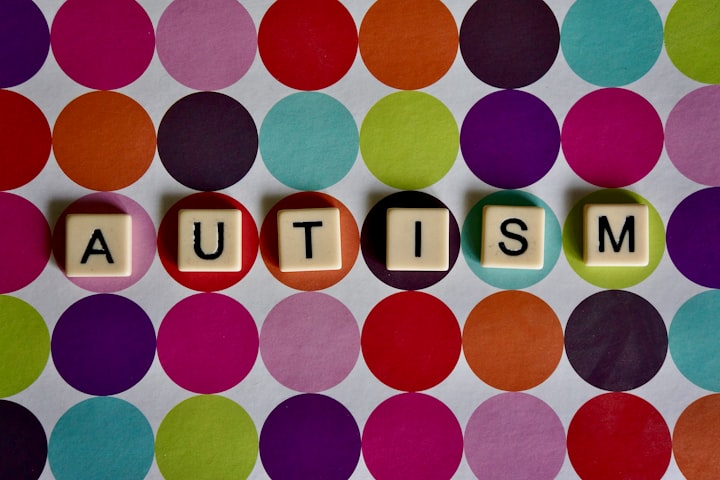Anger Management 101: A Basic Guide For Individuals On The Spectrum
Some helpful tips that I think will help teenagers and adults with Autism manage their anger appropriately

Are you a teenager or an adult living on the spectrum? Are you struggling to properly manage your anger? Do you want some awesome anger management strategies that will help you increase your quality of life and mental wellbeing? If you answer yes to all of these questions, this basic guide to anger management for teens and adults with Autism will be a great read for you, your friends and family! This guide will also be beneficial for anyone in the human services field, especially for those who support teenagers and adults living with Autism.

What is anger?!
Anger is an emotion that differs in intensity from mild irritation to extreme fury and rage. Anger is typically a feeling that humans feel towards someone or something they believe has purposely wronged them. Anger can be healthy, but it can also be unhealthy when it’s kept in for long periods of time. Anger gives people the chance to communicate negative emotions, and it increases ones ability to solve problems. On the contrary, excessive anger is toxic for the mind, body and soul. Excessive anger increases blood pressure, stress, anxiety, skin problems such as eczema, insomnia and increases ones risk of having a stroke. This is because of the incessant flood of stress chemicals and related metabolic changes that go with continuing uncontrolled anger can eventually induce harm to multiple systems of the body.

Now that you know a bit about anger and the health effects of excessive anger, I have 9 anger management tips for you to explore and hopefully apply to your daily lives.
1. Create your own "naughty word box"

We always want to hurt someone whose wronged us. Verbal abuse of any kind is not okay, no matter how many times one has abused us verbally. Whether it's by name calling or belitting someone, any kind of verbal abuse is unhealthy for one another. I've learned that the hard way, and I'm still working on overcoming those behaviours to improve my social and mental wellbeing. In fact, this is a lifelong goal I'm working on overcoming, as I don't believe in setting a specific timeline for this goal.
There's lots of swear words that we typically say when we're angry. Instead of saying them to someone, writing them down on a piece of paper and hiding it in your "naughty word box" is helpful for those who have a habit of swearing and name calling. It's helped me over the last few years, because I know that I can say whatever's on my mind without hurting one's feelings. I'm the kind of person that's very expressive, so writing curse words down has helped me act on that urge without actually saying it to the person. Crumpling the piece of paper and hiding it in my "naughty word box" that's kept in my closet is not just helpful but also extremely private.
To create your own naughty word box, all you need is a box, art supplies, pens/pencils and plenty of lined paper for writing! For my naughty word box, I used a old disposable mask box and washable markers to doodle and write "naughty box" on it, because it was all I had at the time. Practice this technique on a regular basis and you'll notice the positive outcomes and benefits it has on your emotional health!
2. Practice laugh therapy

Whether I'm angry or not, I'm a huge believer in laughter and it's amazing mental health benefits. Laughing reduces stress, releases endorphins and increases life tolerance, just to name a few of the mental health benefits laughter provides.
I laugh pretty much every day, and I laugh about pretty much anything. To force myself to laugh every day, I watch my favourite funny YouTube video clips repetitively, remember the most ridiculous things I did in the past and imagine myself doing the most outrageous things like going out in a rainbow costume and have everyone look at me. Simple things like that can make a huge impact on your mood and your ability to incorporate laughter into your day.
Other things that you can do to make yourself laugh are reading jokes, telling jokes to your friends and family, watching comedy films and many more!
3. Do some intense physical activity

Exercise doesn't just improve your physical health, but also your emotional, psychological, mental, social and cognitive health. Regular physical activity releases stress and anxiety, improves sleep hygiene, increases self-esteem, elevates mood, lessens mental fatigue and improves mental clarity. Places to practice physical activity at include your local fitness centre, the park, in your home and at certain athletic facilities like bowling alleys, boxing gyms, tennis courts and hockey rinks.
Depending on what you're interested in pursuing, there are a wide range of sports activities that enable constant movement such as kickboxing, muay thai, krav maga (Israeli martial arts), zumba, gymnastics, bodybuilding and many others you can find and pursue! I enjoy doing physical activities like hiking, dancing, playing ping-pong, bowling, walking, doing aerobics, cycling at the fitness centre, playing basketball the odd time and playing other sports like tennis. I mainly work out at the parks, at home and at the fitness centre that's next door to me. I love going to the fitness centre because I get to meet new people, as well as having the chance to try out other things that I can't do at home or at the parks like walking on the treadmill.
It's never too late to start exercising! Just find something you'll most likely enjoy doing and, pick a place of interest and get moving!
4. Express your emotions through visual arts

As a long-time amateur artist, I believe in the tremendous psychological health benefits that visual arts provides. Doing any form of visual art like painting, adult colouring, sketching and doodling improves one's ability to control their emotions, fosters creativity and it's a natural mood booster. When you're dealing with a traumatic situation like losing a loved one, divorcing your spouse, getting fired from your job or witnessing domestic violence, one way of expressing raw emotions is by creating art.
For me, living with a disability can be very challenging. I was bullied in school and it makes me experience the odd flashback, which can lead to anger and frustration. Managing my anger long-term only becomes easier when I'm practicing any kind of visual art like painting or drawing. 15-20 minutes after settling into my own space and doing art, I notice my stress and anger slowly melting away.
Trust me, it helps! Whatever form of visual art you enjoy doing the most, use it as a means to help you deal with anger. Pick a space that you feel the safest in, grab your art supplies and practice some art therapy!
5. Write a "fake letter" to someone who has angered you

Writing a fake letter to someone who has wronged us can help us alleviate some of the pain and anger we've held onto. Although we may not be ready to write the fake letter when we're not in the right mental state, it would be beneficial for us to do it when we are calm enough to gather our thoughts. I've been emotionally and verbally hurt by friends on multiple occasions that what helps me is writing a fake letter. Fake letters are very helpful, especially for those who won't be receptive to our insight. At least, we get rid of some of the toxic emotions we've been bottling in.
Writing a fake letter is super easy, just like chopping up lettuce and putting it into your salad bowl. All you need is lined paper or your computer, pens/pencils (if you're writing it on paper) and the person who you want to write the fake letter to. Hopefully, this will help you manage your anger in the long-run. If you start now, it will be a method that you'll want to use for the rest of your life. It's never too late to start!
6. Relax in a dark and/or quiet place

People with Autism are prone to feeling over-stimulated. This may not be the case for all people with Autism, but I can definitely feel over-stimulated sometimes, especially when I'm feeling angry.
In that case, I would turn off all the lights in my apartment, turn the blinds down, go in my bedroom or closet with the lights completely off. The lights themselves or the background noise I can hear from my bedroom or living room window can be overwhelming for me, when I'm in a bad mental state. So I lay in either my bedroom or closet with the lights off and I begin to notice my anger gradually fade away and I feel super tranquil within the next 10-15 minutes. After the 15-minute period is up, I go back into my exuberant self, turn all the lights back on and turn up the blinds to hear and see all the beauty of the suburbs from my apartment!
The dark place doesn't only have to be your bedroom or closet. Depending on your living circumstances, it can be in your basement, the living room (if no one is living with you) or a specific place in your apartment or house like your office. If you love spending time outside in the dark, places like caves and your own backyard can also be good spots for you, depending on whether you live and your ability to find places like these! Trust me, you'll notice the special effects it has on your mood once you start practicing this "unique anger management method". If you start now, you'll want to keep doing it! You can even share this special technique with your friends, colleagues, family members and mental health professionals, if you think it will be helpful for them in the long-term.
7. Write a song, poem, story or diary entry about what makes you angry

Out of all the therapeutic techniques that are suggested by therapists, teachers and other human service professionals, writing is one of the best and most-recommended forms of anger management. Writing improves ones ability to solve problems, strengthens creativity and is a natural mood booster, just to name a few of the mental health benefits writing provides. Any form of writing is amazing, whether you enjoy writing poetry, songs or stories and/or diary entries.
For me, writing has made me feel safe, secure, calm and confident since I was a young child. Kids and teachers weren't always tolerant of me, so writing stories in my journals was one way of me coping with a lack of acceptance, frustration, anger and alienation. My diaries were like "my best friends and therapists" when I felt lonely and unaccepted. I would write the most preposterous stories or write letters to random people or things and I wouldn't feel judged. When I was 21 and decided to pursue writing on a more serious level, I found my calling for creative writing: writing poety. I have a huge imagination and the innate talent to see and/or personify things like letters of the alphabet, plants, animals, puppets and certain body parts like eyeballs that others wouldn't. Thanks to my Autism, this natural-born talent of mine has driven me to pursue poetry writing. Not only does poetry give me a sense of fulfillment and peacefulness, it's also a way for me to cope with my trauma, disability and flashbacks in the long-term. I enjoy other forms of writing too, but poetry writing has been my main focus lately.
If you enjoy creative writing, this would be another perfect therapeutic anger management technique for you. Whether you do it as a career or as a hobby, it's still pretty effective. If you're writing manually, all you need is plenty of lined paper, pens/pencils/erasers and a big imagination. If you're writing digitally, you'll need a computer, a special kind of software like Microsoft Word and/or writing platforms like AllPoetry if you choose to publicize your poetry. You can choose to share your work with the public or keep it private. Either way, I think it's a beautiful thing to pursue.
8. Talk to someone who is reliable, trustworthy and supportive

Talking it out with someone is very helpful. For people like myself who enjoys conversing with one another and can't manage to lay down alone and "swim in my own pool of thoughts" for too long, this should be your second or third resort.
Luckily, I have a large network of supportive people like my parents, brothers, a wide circle of friends and my therapist who's a reliable resource. Since I was little, I've always enjoyed talking out my problems with someone, because I was used to having someone around me all the time. During my early childhood years, I was surrounded by ABA (applied behaviour analysis) therapists 7 days a week, so I was so accustomed to receiving regular emotional support. I don't want to deprive myself of that, because I grew up with lots of emotional supports not just from my therapists but my family and friends. Sometimes, I have the need to talk about something repetitively, because I take longer to process certain social and emotional situations. I've gotten better at perseverating less over the years, but I still have a tendency to do so. My parents, brother, friends and therapists are the best people for me to talk about things more than once with.
Whether it's a good friend, your parent, a teacher, spiritual leader or a mental health professional, I believe it's a smart idea to always talk it out with a trustworthy and supportive person in your life. I don't recommend solving everything on your own, as it can lead to risky behaviours and accumulated feelings of anger, sadness and frustration that can become unmanageable later on. Even if you need to talk about something more than once, it's better to talk about it than to hold it in. Just find someone who will be able to tolerate your need to talk about things repetitively, especially if you take longer to process situations.
9. Get out of the house and do something that gives you joy and happiness

Whether we have Autism or not, everyone has a "safe spot" of their own. Each safe spot is different for everyone based on their comfort levels, interests, hobbies, personality traits and where they live. Some people are more city people who crave places like bars and shopping malls, some are more town people who love bookshops, parks and cafes and some are in the middle. Having a safe spot gives us a chance to unwind and do something we enjoy doing in the community. The best thing to do is to go alone, because it will give you some space to reflect on your emotions.
For those who don't know, I'm both a city and a town person. I love going to the malls and restaurants, but I also find it fulfilling to spend time at local parks, libraries, small cafes and privately-operated bookstores. Although places like libraries, parks, small cafes and privately-operated bookstores are also found in the cities, there are tons of them in the suburbs and small towns that I enjoy visiting. There are tons of parks near where I reside, so it's quite pleasant to take a break from real city life and appreciate what suburban life provides. I can't be in overly stimulated places like overly popular restaurants, because it can make me more overwhelmed when I'm angry. Places like libraries, parks, small cafes and less crowded bookstores are my top 4 safe spots to visit when I'm angry or just need space after a tough day and/or week.
Picking a safe spot or two shouldn't be a problem. Focus on where you live and what's in your neighbourhood. Places like parks, libraries, toy stores, small and less crowded cafes and ice cream parlours, ponds, pools and spas are some possible options for those who don't like going to busy places as often. For those of you who don't mind the action but need to be out of the house, facilities like arcades, shopping centres and skating rinks are perfect options for safe spots! These specific facilities can be enjoyed by you and your friends, or even on your own!

Conclusion
As I've stated multiple times in other Vocal articles and poems I've written, I had anger control problems in my childhood and teenage years. I made some choices that didn't benefit me and those around me, because I had the inability to appropriately convey and deal with my anger. I had trouble calming down and I would say and do things that I later regreted. I used to assume that I would be "confident" or "strong" if I raised my voice or said something that wasn't kind to someone. As I got older, I began to realize that people are actually at their weakest when their angry, not their strongest. Anger began to negatively impact my social, psychological, mental and emotional health, so I knew that I had to develop some strategies and confidently use them. I couldn't just come up with strategies and not practice them with confidence and motivation. It took me quite a few years to build that motivation to control my anger and to manage it long-term. In addition to the motivation that I had to increase over time, it also took a huge network of therapists to find strategies that I could use at home, school, work and in the community.
I'm the kind of person that needs a release when I'm feeling angry. I can't just sit there and let it sit for long periods of time. Since I needed a release rather than to just lay down and think, I used to do things like throw household objects and kick my bed. My therapist recommended that I release my anger by doing activities like physical activity and journalling. I exercise every day and do creative activities to not just help me control my anger in the moment I'm feeling angry, but also to reduce as many episodes and meltdowns as I can. Now that I understand the negative consequences of anger, I believe that writing this guide will not only help others, but also myself. I feel much more confident and empowered when I help others who have had the same challenges as me growing up.

Thank you for taking the time to read this informative and visual guide. I hope you enjoyed reading it just as much as I enjoyed writing it. If you found this guide beneficial, please give me a ❤️, share it with others and don't hesitate to send me a tip to show your appreciation, interest and support. To read more of my Vocal poems, articles and stories, please subscribe to me and view my public profile at anytime! Please feel free to follow and connect with me on Instagram. Take care, be healthy and have a splendid rest of the weekend.
IG Account: @naturalbibliophile22
#angermanagement #autism #teenagers #adults #support #mentalhealth #don'tgiveup #bestrong #behealthy #behappy #beyourselves #bekind

About the Creator
Talia Devora
Poetess, visual artist and lifestyle/quiz writer! My pastimes include reading, sleeping, gaming, music, fitness, etc! Be yourselves, be kind and value life! Let's connect and be friends!
My IG accounts: @tdwrites24 & @tdcreates97






Comments
There are no comments for this story
Be the first to respond and start the conversation.